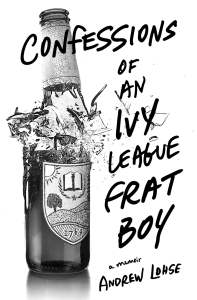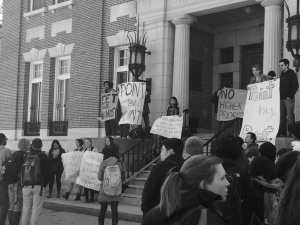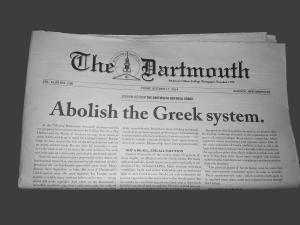2012
January 25 – Lohse’s First Column – The now-infamous Andrew Lohse publishes his initial (and quite dubious) expose of Dartmouth’s hazing rituals as an Opinion piece within The Dartmouth. Exposure did not quite reach the level of his later endeavors, but this column ultimately got the ball rolling for the next few years of Dartmouth controversies.

Lohse would later spin his article into a full-length memoir, garnering an extension to his 15 minutes of fame.
March 23 – Departure of President Kim – President Kim announces his departure from Dartmouth after being called on by President Obama to head the World Bank. Stating that “the prospect of leaving Dartmouth at this stage is very difficult,” Kim seems to have recognized the looming distress that the College would soon be engaged in, but ultimately left after winning the election in April. He was replaced by Interim President Carol Folt.
March 28 – “Confessions of an Ivy League Frat Boy” – This Rolling Stone article by Janet Reitman brings Dartmouth’s issues to the mainstream. This article explores the alleged abuses perpetrated upon Lohse and many others in the SAE fraternity, claims that have since been refuted by a plethora of brothers. Regardless, with a total of over 20,000 shares on social media, the negative impact of this piece on public perception of Dartmouth cannot be understated.
April 9 – Fallout – Dartmouth alum from the class of 2009 Ravital Segal, a sister at Kappa Kappa Gamma sorority, follows up Lohse’s claims with her own column in the Huffington Post. Segal details her own experience with hazing while criticizing President Kim for his “fear of reduced alumni giving and campus tension.”
Fall of 2012 – Alpha Phi Alpha Incident – Yesuto Shaw joins the ever-growing list of whistleblowers as he brings to light incidents of hazing at Alpha Phi Alpha fraternity, in which pledges were allegedly beaten. This event drew controversy because of the relatively light punishment dealt to the fraternity, which many attribute to racial bias.
2013
March 31 – Clery Act Investigation – A group of Dartmouth students files a complaint with the Department of Education under the 1990 Clery Act. They claim the school “violated students’ civil rights by not thoroughly investigating sexual assaults, and failed to obey the Clery Act, a federal law that mandates the accurate tracking and public disclosure of crime statistics on campus, including sex offenses.”
April 19 – RealTalk / Dimensions Protests – Another group of students in the student organization RealTalk launch a protest during the incoming-student centered Dimensions weekend, interfering with the important weekend for the College. The protest called attention to “homophobia, sexual assault and racism on Dartmouth’s campus.” Ultimately, the protesters were charged with violating the school code of conduct, and classes were canceled on April 24 and replaced with opportunities for discourse on the aforementioned issues on campus.
May 2 – Parker Gilbert Assault – Then-freshman student Parker Gilbert allegedly rapes another freshman student in the early morning after a night of partying. Gilbert is initially charged with four counts of aggravated felony sex assault.
July 1 – Hanlon Takes Office – Current President Philip Hanlon joins Dartmouth as its eighteenth president. Dr. Hanlon was a member of the class of 1977 in addition to Alpha Delta fraternity. Upon assuming office, Hanlon remarks that he is “excited to be leading Dartmouth in a period when I believe higher education is going to change in important ways.”
July 26 – Bloods & Crips Party – A party organized by Greek organizations Alpha Delta and Tri-Delt is deemed racist after encouraging students to dress up as a member of either infamous Los Angeles-based gang. The event drew significant negative media attention, prompting a release from AD stating that “While there was never any ill intent in the party’s theme… the gravity of our oversight is now apparent to us.”
Fall – The Beta Files – A series of private email exchanges by members of Beta Alpha Omega fraternity surface, publicized on Gawker. The emails detail hazing and pledge rituals. The fraternity is placed on probation for hazing and providing alcohol to minors, but most importantly because of the providing of alcohol to someone who allegedly perpetrated a sexual assault.
2014
January 10 – b@b Rape Guide – A “rape guide” is posted to popular Dartmouth student message board Bored @ Baker. The post details how one should behave in order to sexually assault a particular freshman girl on campus at the time. The author of the post is no longer a student at the College and the case is in review by the Committee on Standards. Backlash is primarily targeted at the website, even though it is a forum public to all Dartmouth students.
February 24 – The Freedom Budget – This now-infamous collection of radical suggestions (still available online for your reading pleasure) is sent to 13 different Dartmouth administrators. Over seventy students participated in the drafting of this list, seeking to “eradicate systems of oppression [namely racism, classism, sexism, heterosexism, and ableism] as they affect marginalized communities on this campus.” The College offers no immediate, detailed response.
March 14 – Ultraviolet Petition – Fringe feminist organization Ultraviolet releases a petition with over 50,000 signatures demanding that Dartmouth “take sexual assault seriously” despite the college’s recent million-dollar-plus initiatives aimed at risk reduction. Regardless, the organization’s leadership doubts Dartmouth’s ability to change, given its alleged “long history of students and faculty demanding better response to sexual assault.”
March 27 – Parker Gilbert Acquittal – Gilbert is found not guilty and acquitted of all charges in a trial that epitomizes the ambiguity of “drunken, awkward, college sex,” and nonconsensual intercourse. The decision results in public outcry amongst a plethora of organizations, including WISE, drawing skepticism with regards to Dartmouth’s recent commitment against sexual assault.
April 2 – Freedom Budget Protests/Sit-In – Over seventy students affiliated with the drafting of the Freedom Budget launch a sit-in protest in President Hanlon’s office in a movement deemed “Occupy Parkhurst.” Ten students elect to stay overnight in the office, though ultimately their demands (namely, a specific response to all of the Freedom Budget’s points) are not met. President Hanlon offers a campus-wide response, stating “progress cannot be achieved through threats and demands. Disrupting the work of others is counter-productive.”
April 5 – Ultraviolet Reprise – Feminist organization Ultraviolet follows up on their earlier petition by launching a series of social media advertisements targeting Dartmouth specifically for the College’s alleged “rape problem.” Many students respond over social media, criticizing the aggressive nature of the advertisement campaign, which is later expanded to target many more schools.
April 16 – Moving Dartmouth Forward – President Hanlon launches the Steering Committee’s process of review and recommendation for the College. This is part of a greater campaign dubbed Moving Dartmouth Forward. Students, faculty, administrators, and alumni are all invited to be a part of this decision-making committee whose deliberation is still ongoing.
April 25 – Phiesta – Yet another Dartmouth party, this one thrown to raise donations for cardiac assistance, is canceled due to its perceived racist and culturally-inappropriate nature. The Cinco de Mayo inspired party, organized by Greek organizations Phi Delta Alpha and Alpha Phi, is criticized by the offended student as “sadly unsurprising that a culturally-themed party was seen as a casual venture for such a privileged institution.” Phi Delt (and Dartmouth Review) President Taylor Cathcart sardonically supported the cancellation, explaining, “We felt that the possibility of offending even one member of the Dartmouth community was not worth the potential benefits of having the fundraiser.”
September 22 – Pledge Term “Ends” – Dartmouth’s Interfraternity Council, or IFC, decides in a unanimous vote to abolish the institution of pledge term amongst all Greek organizations, stating in the campus-wide email that “New members will enjoy full rights and privileges of current members.” The efficacy of this ban is uncertain and controversial, with many believing that any hazing (which, with the transparency of pledge term, was benign) will simply be forced underground.
October 17 – The Last Word – The Dartmouth’s editorial board releases their weekly Verbum Ultimum column, plastering the front of the paper with an editorial egregiously entitled “Abolish the Greek system.” The editorial is met with widespread student ire and backlash against the paper for producing a heavily biased issue of the paper that was supposed to be objective. Several students quit in protest, and the paper continues to be heavily criticized for the headline.
November 3 – Faculty Jump on Board – A 116-13-3 vote at a faculty meeting passes a motion expressing support for the abolition of the Greek system. The vote comes in wake of an open letter published by a group of faculty that ultimately gathered over 200 signatures. Though the motion carries no actual weight in the process to end the Greek system, the disdain shown to a crucial population of Dartmouth affiliates is a significant blow to proponents of the system.
The Future – The Steering Committee – No one can know for sure exactly what reforms the Presidential Steering Committee, launched initially on April 16 of this year, will enact once their recommendations are released in January of 2015. Under the banner of the Moving Dartmouth Forward campaign, it is likely that significant attempts will be made to combat sexual assault, high-risk drinking, and exclusivity. The committee-members involved have all signed gag-orders and very few notifications regarding their activities have been released. From the limited reports gathered, however, the situation seems to be bleak for staunch proponents of the Greek system as rumors of a hard-alcohol ban, a coed-mandate, and even outright de-recognition have begun to circulate. Only time will tell what the proposals have in store for campus and how the College’s social scene will evolve.



Be the first to comment on "A Timeline of Scandals"